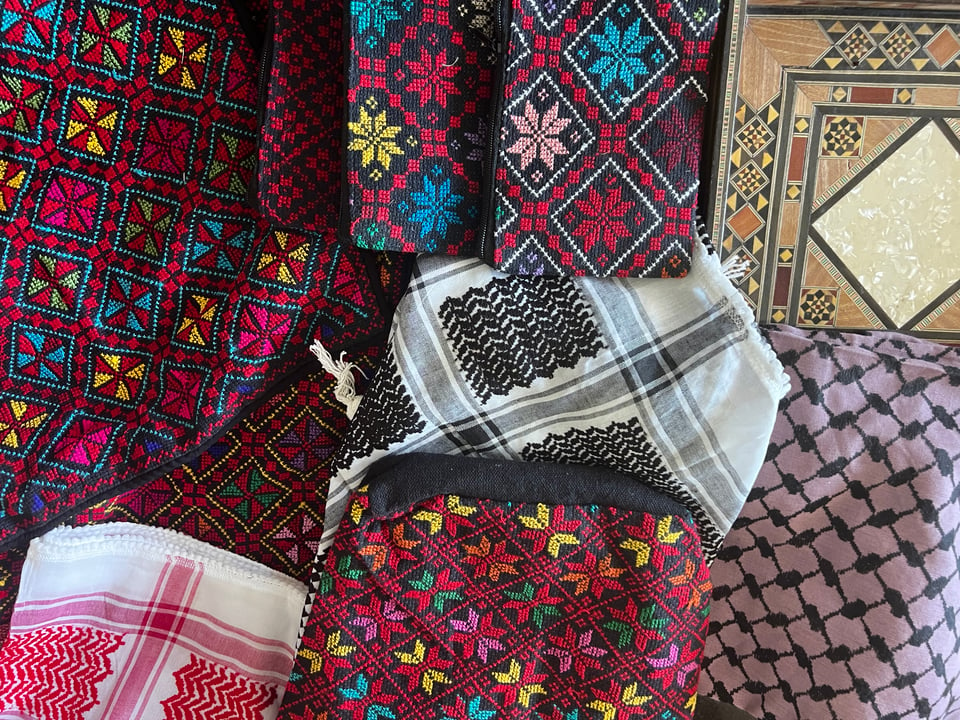Dinner with a family in Bethlehem
Dear Friends,
On my first day in Bethlehem, I asked a small group of men on the street for directions. As they vied to assist, one of them recognized me, and I recognized him! I’ll call him Shadi - I met Shadi when I was in Bethlehem two years ago, at his souvenir shop near the Church of the Nativity. He remembered not just my face, but who I was with, and what we all bought! A couple of weeks later, I saw him do the same thing with a friend of mine who was visiting from Ramallah - he remembered what she had bought the previous year. Shadi works in the shop with his two brothers.
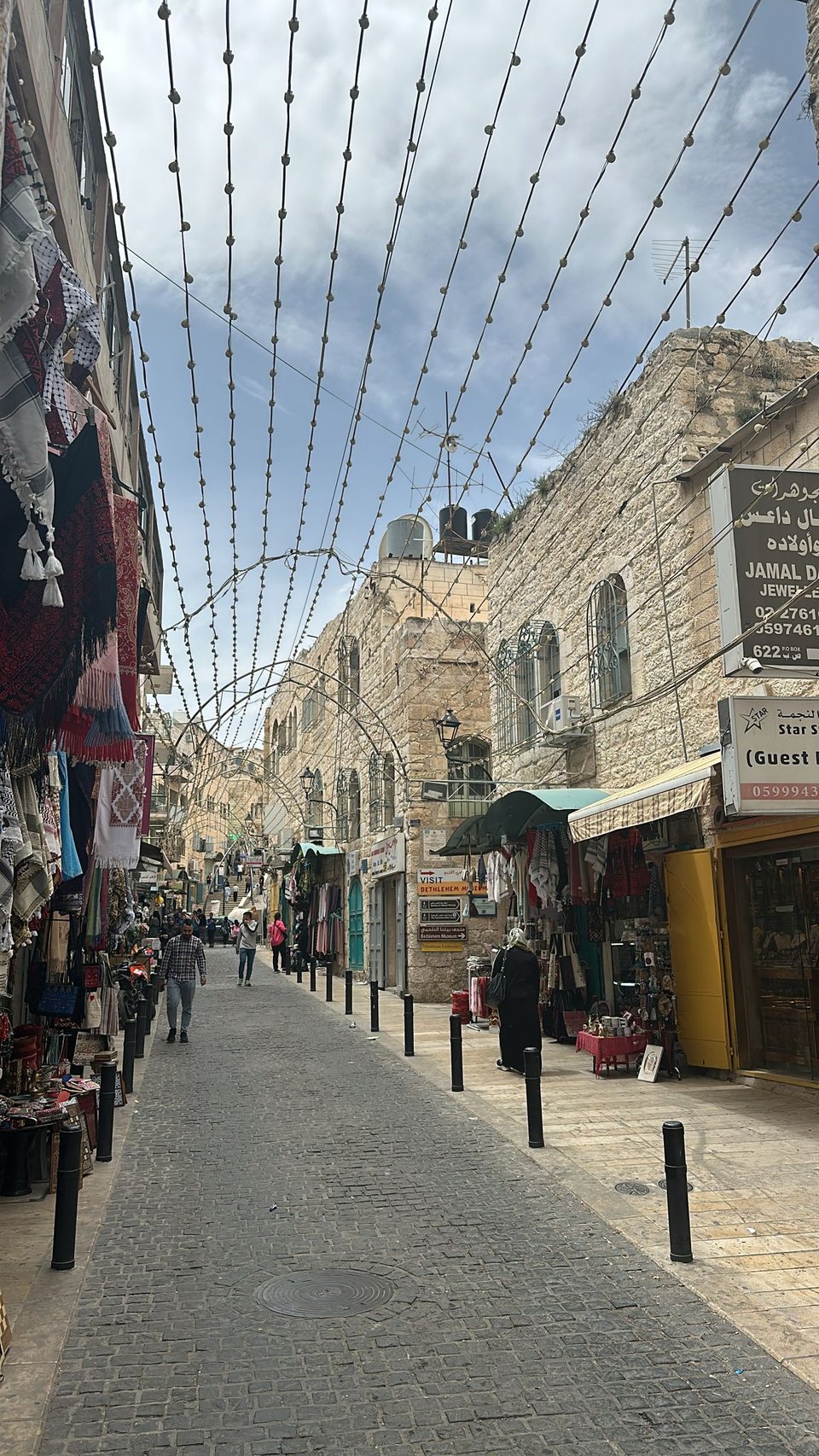
Shadi and his brothers looked out for me throughout my entire stay in Bethlehem, with so much kindness and care. They took me grocery shopping, drove me places, and helped with any and all arrangements I needed. Because of the frequent presence of Israeli soldiers in Bethlehem - and like every person I met in that city - the brothers did not want their photos or real names used.
Shadi invited me to his family home for dinner. He and his younger brother Hassan picked me up at my hotel, and we drove about 15 minutes from the city center to the village where they live. The streets were quiet. The home is a 4-story building. The brothers’ parents live on the first floor, along with Hassan. On the second floor lives Ali, the oldest brother, with his wife and six children. The next floor is for Shadi, his wife, and three children. The family rents out the top floor.
After I arrived, Shadi’s two adorable daughters, Laila (6 years old) and Sara (4) came to greet me with beautiful matching dresses and with very big smiles. Shadi’s baby boy, who will be 1 year old next month, was sleeping and I didn’t get to meet him. But I did have a chance to chat with all three brothers.
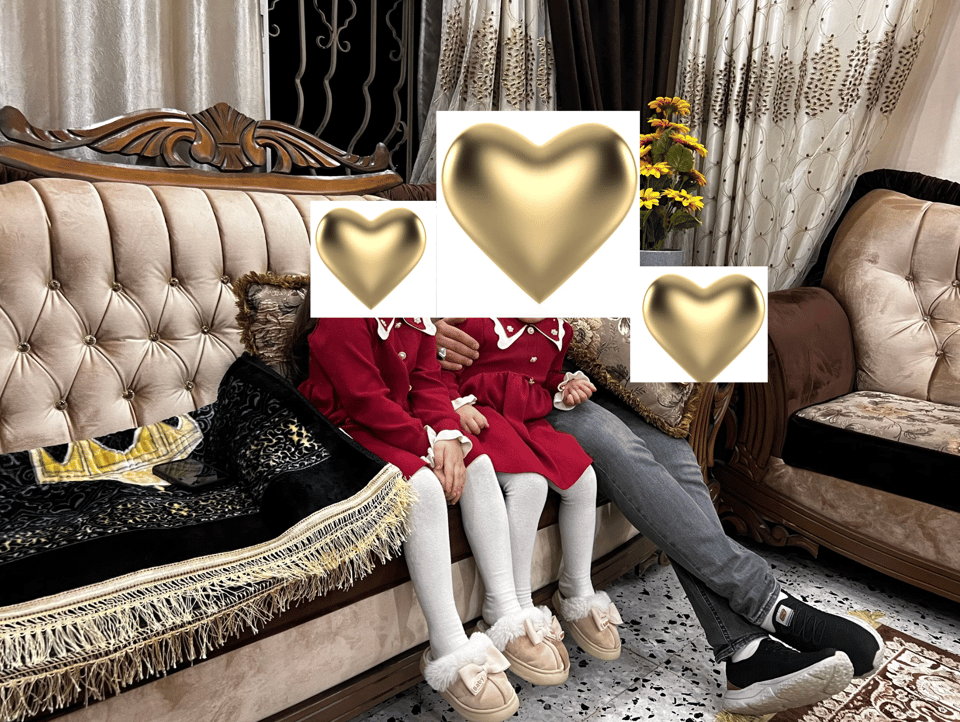
Shadi had asked me what my favorite Palestinian food is. It’s maqluba - a rice, vegetable, and chicken dish that is cooked in a pot and turned upside down to serve. So that’s what Shadi’s wife Reem prepared for dinner. It was delicious.
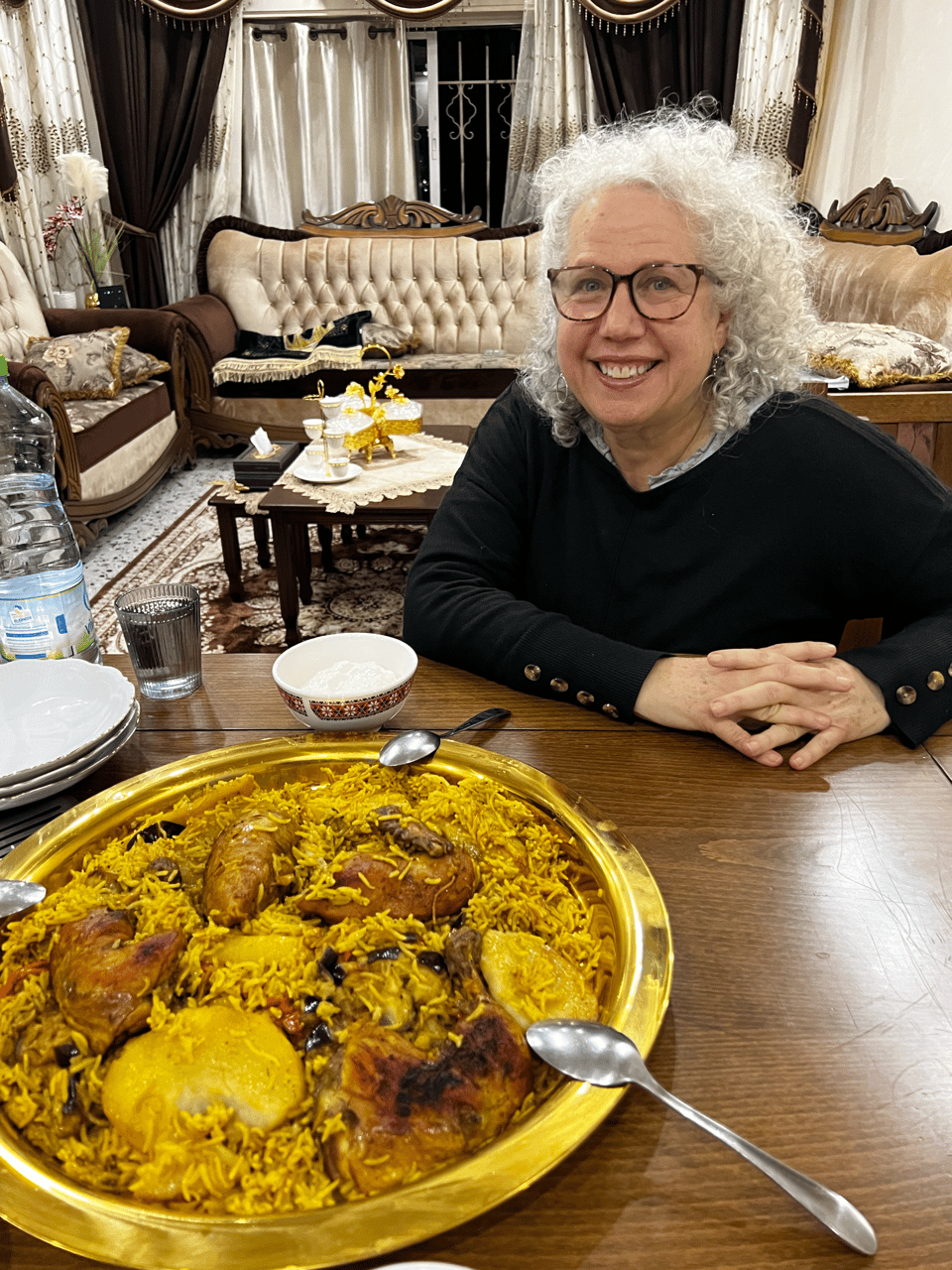
It was a lovely evening, with delicious food, warm company, and eye-opening conversation. Ali had been in Hebron earlier in the day. Without checkpoints, that would be about a 25-minute drive. He traveled there to take his father to an eye specialist, as his father has lost all sight in his right eye, and his left eye has just limited vision. On the way to the doctor, the wait at the checkpoint was an additional 40 minutes. And on the way home, the Israeli military had closed all exits to the city but one. Ali and his father waited more than 4 hours in the car to be able to leave. A necessary trip like this, for essential medical care, reveals some of the brutality of the checkpoint system.
The brothers talked about how much things had changed since October 7. Ali said, “We used to joke around sometimes with soldiers at checkpoints. But now, no. If you move your head the wrong way, they’ll shoot you.” Hassan added, “They’ll punch you if they don’t like your face.” They say you can wait 6 hours, even 10 hours, with kids, and with elderly relatives. Soldiers at checkpoints are sometimes polite; sometimes they are rude, and sometimes they are abusive. Ali said he always hopes that the soldier checking his ID and his car will be an older person. He says, “The teenagers are crazy sometimes. Maybe [the older soldier] has a family, and he knows the feeling.”
Bethlehem is designated as Area A, meaning that the Palestinian Authority is supposed to have full civil and security control of this territory. But that no longer seems to matter. The brothers told me that Israeli soldiers enter the village most nights - most often between midnight and 2 am. Usually it’s to arrest someone - perhaps for throwing stones, or for a social media post, or for no reason at all. Ali said, “Every night, I pray it’s not our home. And I pray for the people whose home it is.”
The pattern is this: soldiers come to a village, forcibly enter a home, destroy things, and leave. Sometimes it’s to arrest someone; sometimes it’s to train new soldiers; sometimes, it’s just to intimidate. You can read testimony from former Israeli soldiers about this practice from the group Breaking the Silence (see below).
The adults hear the soldiers at night, though generally the children sleep through it. But one night two months ago was different, because the soldiers threw sound bombs - these are weapons that emit extremely high-powered sound waves that can damage or destroy eardrums, and can cause severe pain, nausea, and disorientation. The brothers were unable to describe to me the intensity of it, with the whole house shaking. All the children woke up screaming. 6-year-old Laila yelled, “We’re going to die,” while her cousin, 8-year-old Sarah, asked her father: “Are we going to die?” There are no bomb shelters in the West Bank, but the family ran to the first floor of the building to hide under the stairs. Ali’s oldest son, Adam, 12 years old, tried to be brave, and to reassure his younger siblings and his cousins, “Don’t worry. It’s finished now.”
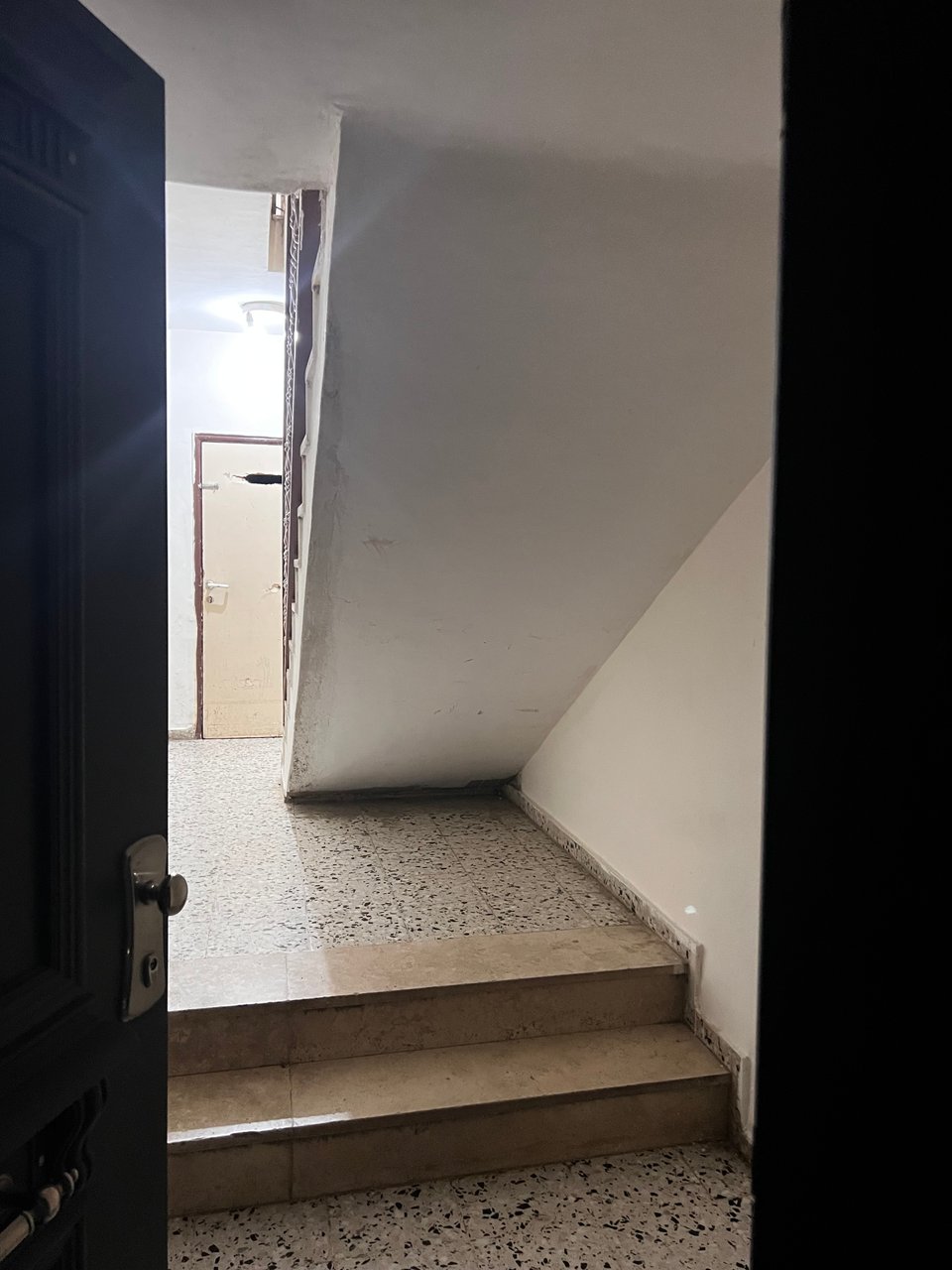
We left the village at 10:30, and they drove me back to my hotel. Two hours later, Israeli soldiers were on the street in front of the family home. The brothers didn’t sleep much that night.
The neighboring village is called Tuqu’ (sounds like too-kow), a little over a mile away. At the entrance to Tuqu’ there is now a temporary structure called a flying checkpoint. It’s usually open only during the day, and at night, there is a closed gate on that road and you have to drive 5 miles to enter the village a different way.
Two weeks after my dinner with the family, Ali drove to Tuqu’ one night to have tea with his sister Noura, who lives there with her husband Salim and their children. Ali said that even though the gate is closed and he has to drive out of the way, there’s little traffic at that hour. He left home at 10 pm, and drove 15 minutes to Noura and Salim’s home. Just as Ali was about to get out of his car, his sister called him and said, “stay in the car - don’t move”. There were about 40 Israeli soldiers on her street. Ali put the car seat all the way down, stayed absolutely still, and was grateful his car has tinted windows. He tried to breathe quietly. Ali said he’d never been more scared. He thought about each person in his family, and wondered if this would be the end of his life. After an hour, Noura called Ali to let him know the soldiers had left.
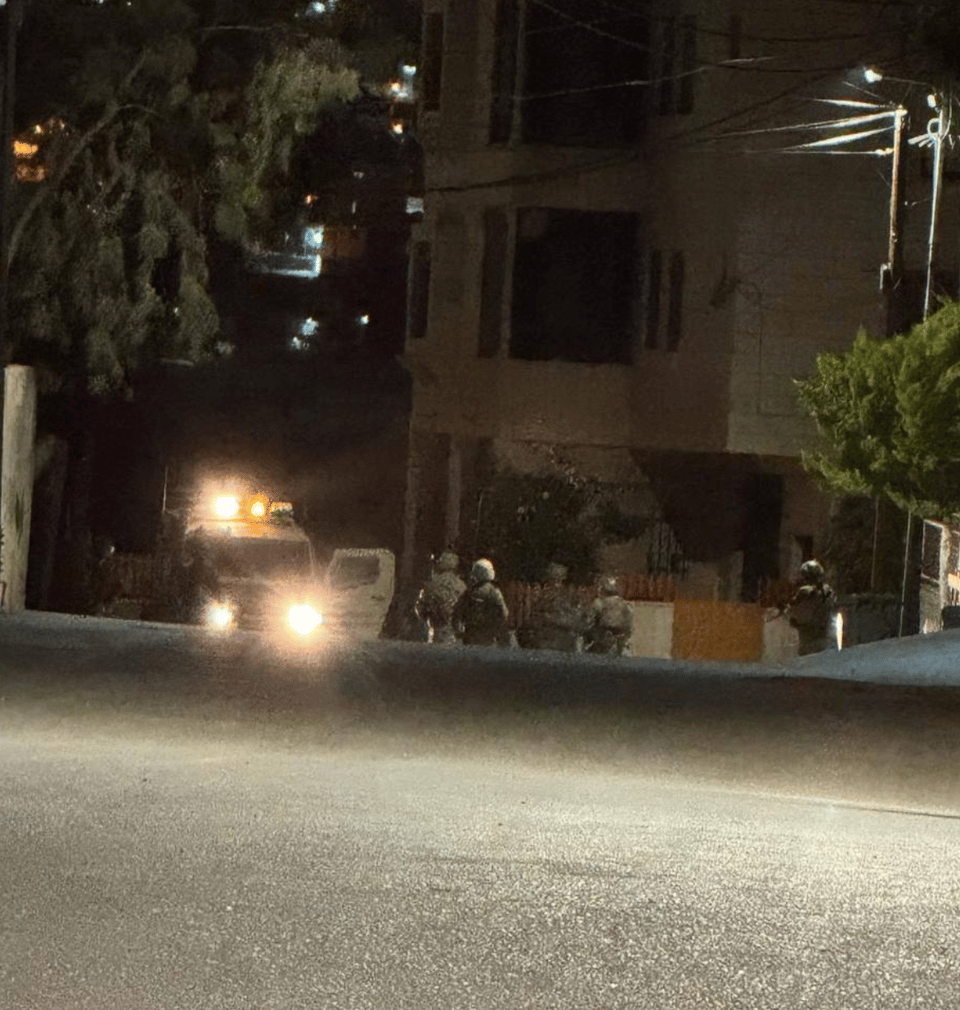
Ali reflected on life in occupied Palestine. He said, “We used to worry about our children’s future. But now we worry about today”. With very few tourists in the city since October 7, he added, “we used to save money for our kids’ future. Now, we’re glad if we can feed them today”.
On my last day in Bethlehem, I had the opportunity to meet the brothers’ mother. It was truly an honor. She raised a beautiful family.
This is life under occupation. What would you do if this was your life?
In spite of this repression, and the hatred shown to them by the policies of the Israeli state, this family does not respond with hate. Their kindness to me, a Jewish American, was extraordinary. I can only say thank you to Shadi, Reem, Ali, Hassan, and their whole family - for your generosity, and for allowing me to share just a small part of your story here.
Salaam,
Nancy
TESTIMONY FROM BREAKING THE SILENCE
What Shadi, Ali, and Hassan described has been reported by countless Palestinians, for decades. We do not need corroboration of their stories from Israelis or anyone else. Palestinians are, and have always been, reliable narrators of their own experiences.
Nevertheless, I share here reports from two former Israeli soldiers that match exactly what the brothers described. These stories have been compiled by the group Breaking the Silence, which has collected testimonies from (to date) more than 1,400 soldiers. Each soldier’s story has been researched and cross-checked with eyewitnesses and other human rights organizations. Most of those who testify choose to remain anonymous. The organization’s website includes testimonies that are organized by topics such as ‘abuse’, ‘arrests’, and ‘assassinations’ - and that’s just the A’s.
Here are excerpts from two soldiers’ testimonies.
“Searches, that was something we did a lot. And I think that in 99% of the cases there was no expectation of finding anything. Meaning after the third search where we didn’t find anything we understood that you don’t always find [something]. But as part of the general attitude too, meaning there wasn’t any intelligence information – ‘Look under the bed.’ … After a certain period of time searching, we would just leave. How do you do a search in a home? You do the routine of entering, placing the family on one side, and then starting the search. The platoon goes around, searches. The houses are usually small. Like, it’s already crowded, and you start messing things up: pulling the sheets off the bed, turning the bed over, opening closets, searching…. You take posters off the walls, take pictures off – a treasure hunt. We turn upside down anything we think based on our own judgment could contain something. And that’s the first and main stage, you just turn the whole house upside down.… We also had all kinds of these very primitive tools for breaking walls: you go in with a hammer and some kind of tool which is like this kind of chisel, this circle with a handle that you put against the wall, pull the handle and like tap. …. To the point where [we did it in] every second or third house we did a search in….”
Here is video testimony from a former Israeli soldier, who describes the process of nightly arrests, and taking over a home of a Palestinian family in order to sleep the night. “We took over a school and it became our base and we would leave from there to make arrests. Every night you, not exactly arrests. Every night, you go from house to house, trying to reach all kinds of, asking the aunt, the mother, but there’s nothing you can do…. During the day, the city is under curfew, and at night, there comes a time that you want to sleep, to rest….” He explains that typically, the whole unit of 30-45 soldiers went into a house to spend the night. In one home, the parents yelled at the soldiers. The soldier continued, “How dare they?… Can’t you see what’s going on in front of you? And I remember thinking, you don’t understand. We’re the good guys, here to arrest the bad guys, and you’re probably a good family, you must be… That’s why we came to [sleep in your house] because you’re innocent. You don’t spend the night at a house where you’re questioning, you spend the night in houses where you know there’s no problem….”
